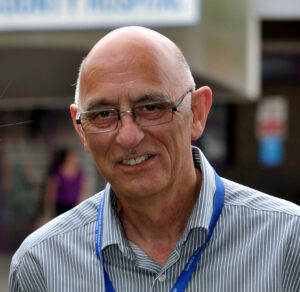Improving the cancer patient experience, with David Chuter

Public Policy Projects spoke to patient advocate David Chuter about the experience of cancer patients within the NHS, and how improved co-production and communication can lead to improved patient outcomes and boost participation in trials.
David Chuter was diagnosed with Oesophageal cancer in 2006, has been a carer for his brother who also suffered with Oesophageal cancer, and has been actively involved in patient advocacy since his diagnosis. He is currently Chair of the Surrey OG Cancer Support Group, Chair of Digestive Cancers Europe Patient Group and Chair of EORTC Patient Panel, among other roles.
Communication and informed decisions about care
For meaningful improvement in the delivery of cancer care, patients must be at the heart of all policy decisions. Patients must be able to make more informed decisions about their treatment and care. For this to happen, available treatment and care options must be clearly communicated to patients, or a trusted person if the patient is unable to make the decision, so that they can make informed decisions about their treatment pathway.
Recommendation: A standardized PROMS strategy for cancer treatment should be implemented across the NHS, with outputs that are accessible for patients receiving treatment. This will mean that current patients can learn from the experiences of others, and make informed decisions about their own care, with the knowledge about how treatment options will impact their quality of life.
Trials and research
During our discussion, it emerged that a lack of transparency and communication between services in the NHS is a hinderance to patient participation in trials. Clinicians are not always aware of trials taking place for particular cancers which may be relevant to patients. However, some patients would be willing to travel to take part in relevant trials which have the potential to treat their cancer.
As David highlighted, “every consultant wants to do the best for their patients and provide better care”. If clinicians were better informed about the trials taking place in and around their patch, research would be made more accessible to patients and increase participation.
Recommendation: NHS England should create a central trial/research directory, so that clinicians understand which trials are taking place where, in order that they can direct patients to the appropriate trials for which they are eligible.
Patient trust in trials and data
The safe and appropriate use of patient data is essential for understanding patient outcomes and contributing to research. Often, there are concerns from the public around the safety and security of data collection, storage and use in the NHS.
However, this distrust of data handling appears to be dispelled once a person becomes a patient, and experiences first-hand the value of data sharing and involvement with trials. Consenting to the sharing of patient data and involvement in clinical trials are beneficial for patients in a number of ways. Data sharing generates regional and national insights which can inform clinicians and improve the standard of care. Additionally, involvement in clinical trials can mean early access to innovative and life-saving treatment and care.
Recommendation: Efforts should be made to amplify the voices of patients who can share testimonials of how the correct use of data, and involvement in trials, can contribute to improved care and outcomes.
Recommendation: NHS England should create an openly available directory of national cancer datasets, alongside outcomes of trials and the benefit trials bring. If actively communicated, this will educate the public about the benefits of data sharing and trial involvement and help boost participation.
Patient support groups
Support systems are essential for anyone coping with a cancer diagnosis and the experience of treatment. For those without a strong social network, or who need support from those having similar experiences, support groups are essential to provide comfort, reassurance and companionship for those diagnosed with cancer.
Patients report that patient-to-patient support is important, not only for patients themselves, but also for friends, family and carers who are involved in the care of a loved one. While lots of patient support groups exist across the country, they do not always receive support from the NHS, and patients are not always informed about the support available in their area.
Recommendation: Clinicians should be made aware of local patient support groups, and patients should be signposted to support groups, where appropriate, by their healthcare providers.
Patient apps and digital access
Patients often use apps to manage their appointments and care. However, these apps are not always user-friendly, and patients can find that they are using multiple apps, all with different layouts and functions. For many patients, this can be complex and make managing care via apps difficult. This difficulty is amplified for patients with less digital capability – which often includes older or disabled people.
Recommendation: The NHS app should be used as a central portal for other services currently offered by medical management apps. This should be co-designed with end users to ensure good user experience, and should prioritise ease of use for those who are less digitally confident or able.
This interview took place as part of PPP’s Cancer Care Delivery Plan programme, which culminates in the Cancer Care Conference . To get involved, please contact:
Willy Morris – Partnerships Manager at willy.morris@pppinsight.com
Mary Brown – Policy Analyst at mary.brown@publicpolicyprojects.com
Alongside his roles listed above, David Chuter holds the following positions:
- Lead and Rest of England Governor, Royal Surrey County Hospital NHS FT
- Lay member, NHS Leadership Academy
- Patient Advocate and PPI Panel Interviewer, NIHR Academy
- PPI Representative to the Partnership Board, NIHR Kent, Surrey and Sussex Clinical Research Network
- Trustee, ICPV (Independent Cancer Patient Voice)
- Executive Group Member, use MY data
- Board member and Chair of the Patient Panel, DiCE (Digestive Cancers Europe)
- Chair of the Patient Panel, EORTC (European Organisation for Research and Treatment of Cancer)

